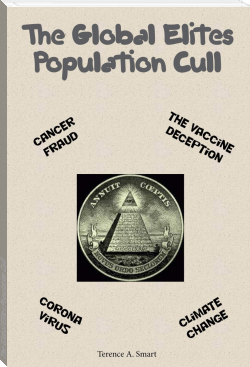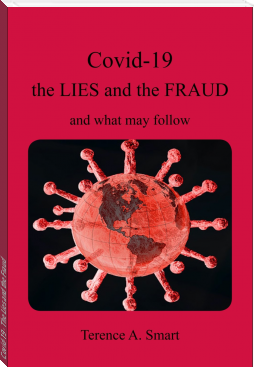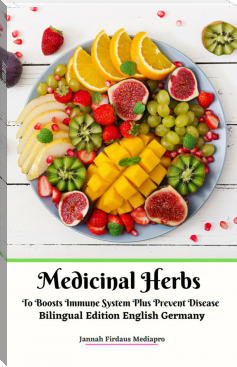The Global Elites Population Cull - Terence Smart (best feel good books TXT) 📗

- Author: Terence Smart
Book online «The Global Elites Population Cull - Terence Smart (best feel good books TXT) 📗». Author Terence Smart
Broccoli belongs to a family of vegetables called cruciferous vegetables and its close relatives include brussel sprouts, cauliflower, and cabbage. Broccoli contains sulforophane, a sulfur-containing compound present in cruciferous vegetables. A cup of cooked broccoli offers as much vitamin C as an orange, and is a good source of beta-carotene. Broccoli contains vitamins B1, B2, B3, B6, iron, magnesium, potassium, and zinc too. It also provides fibre and is low in calories. Broccoli is a great source of vitamins K and C, a good source of folate (folic acid).
Recent tests on cells, tissues and mice show that a sulfur-rich broccoli compound, sulforaphane, blocks a key destructive enzyme that damages cartilage. It's thought that increasing broccoli in your diet may help to slow down and even prevent arthritis.
Sulforaphane in broccoli has also been shown to kill cancer stem cells, thereby striking to the root of tumor growth, and the broccoli compound glucoraphanin, a precursor to sulforaphane boosts cell enzymes that protect against molecular damage from cancer-causing chemicals.
If you boil your Broccoli in water for too long it will lose vital nutrients so it is best to steam your Broccoli and other vegetables or boil them slightly.
Maybe Popeye was right as Spinach is regarded as amongst the World's healthiest vegetables in fact spinach comes out at the top of a ranking list for nutrient richness. Rich in vitamins and minerals, it is also concentrated in health-promoting phytonutrients such as carotenoids (beta-carotene, lutein, and zeaxanthin) and flavonoids to provide you with powerful antioxidant protection.
The health benefits of spinach include improved eyesight, healthy blood pressure, stronger muscles, the prevention of age-related macular degeneration (AMD), cataracts, atherosclerosis, heart attacks, neurological benefits, bone mineralization, anti-ulcerative and anti-cancerous benefits, skin protection, healthy fetal development, and boosted growth for infants.
Even though virtually all vegetables contain a wide variety of phytonutrients including flavonoids and carotenoids, spinach can claim to have the most phytonutrients. Researchers have identified more than a dozen different flavonoid compounds in spinach that function as anti-inflammatory and anti-cancer agents. The anticancer properties of these spinach flavonoids have been sufficiently impressive to prompt researchers to create specialized spinach extracts that could be used in controlled laboratory studies. These spinach extracts have been shown to slow down cell division in human stomach cancer cells (gastric adenocarcinomas), and in studies on laboratory animals, to reduce skin cancers (skin papilloma’s). A study on adult women living in New England in the late 1980s also showed intake of spinach to be inversely related to incidence of breast cancer.
Spinach’s high levels of chlorophyll may have anti-cancer benefits. A 2001 Japanese study found that spinach leaves contain two powerful antitumor promoters. Here is a link to the study:
https://www.jstage.jst.go.jp/article/bbb/66/2/66_2_248/_pdf
Barley is one of the most alkaline foods known to man. Barley Leaves Extract is an alkaline/acid balancer which is so often lacking in most western diets. The barley leaves extract contains an enzyme known as peroxidase. This enzyme makes carcinogenic substances harmless and prevents normal cells from becoming cancerous. This ‘superfood’ is packed to the brim with nutrients and is a powerful antioxidant. A highly concentrated source of both vitamins and minerals, barley grass gives the body a hit of vitamins A, C, B1, B2, folic acid, and B12; calcium; iron; potassium; and chlorophyll, ‘nature’s detoxifier’. Barley grass is also one of the only plants in nature that can provide the human body with all of the nine amino acids that are so vital for health and well-being
An experimental study was carried out at George Washington University (USA) by Allan L. Goldstein, PhD. The researchers used dehydrated barley grass extract to kill leukemic cancer cells. All of the leukemic cancer cells were killed. The researchers also tested the effects of the extract on brain cancer cells. Results revealed that the dehydrated barley grass extract eradicated 30 to 50% of the brain cancer cells. And on their third trial, the extract inhibited the growth of prostate cancer cells which was from 90 to 100 percent.
However, because these findings were not discovered within a clinical trial, it cannot be considered scientific evidence. But for as long as cancer remains the prolific killer that it is, there will also be people who are sufficiently encouraged by the anecdotal evidence to take barley grass as a supplement.
Barley leaf extract can be bought in powder or capsule form on the internet.
Another super alkaline food is Wheatgrass. It has an amazing ability to cleanse the blood, organs and gastrointestinal tract of debris and toxins; it increases the red blood-cell count and it also lowers blood pressure! Wheatgrass also stimulates your metabolism and the body’s enzyme systems by enriching the blood. Wheatgrass fights tumours and neutralizes toxins which makes it essential to have for anyone who goes for chemotherapy which produces toxins in the body and Wheatgrass is a known detoxifying tool.
Wheatgrass is a concentrated source of many nutrients, especially Beta-carotene (Vitamin A), Calcium, Iron, Vitamin K, Vitamin C, Vitamin B12, Folic acid, Vitamin B6 and other trace nutrients. Wheatgrass contains a ton of antioxidants, has more vitamin C than oranges, and is a complete source of protein (thanks to having 17+ amino acids). Since amino acids are the ‘building blocks of protein’, our bodies use them to repair cells and build muscles. For patients suffering with cancer, it’s always important to keep repairing cells because traditional cancer-killing methods like chemotherapy and radiation destroy healthy cells in the process of killing cancer-causing ones. Wheatgrass Juice is one of the best sources of living chlorophyll available. It contains 70% chlorophyll, chlorophyll being the basis of all plant life. Wheatgrass offers the benefits of a liquid oxygen transfusion since the juice contains liquid oxygen. Oxygen is vital to many body processes and don’t forget cancer cells cannot exist in the presence of oxygen.
How does Wheatgrass help cancer sufferers?
First think of chlorophyll as blood for plants.
Haemoglobin in red blood cells carries oxygen throughout our bodies.
Chemotherapy literally means killing cells with drugs so the cancerous cells don’t multiply and spread. However, the blood cells created in our bone marrow are sensitive to chemo and they get destroyed in the process (myelotoxicity), even if they’re not cancerous.
When red blood cells decrease, there’s less haemoglobin and our bodies have a harder time supplying oxygen to our tissues, organs, and cells.
Drinking wheatgrass juice increases the haemoglobin-type substance to transport additional supplies of oxygen to our blood. Red blood cell counts rise very quickly when patients drink wheatgrass. When the red blood cell levels multiple, more oxygen is available to travel throughout the body.
But wheatgrass juice may be able to boost low levels of white blood cells, helping to prevent this condition from occurring. This claim is supported by a 2007 study published in Nutrition and Cancer involving 60 breast cancer patients undergoing chemotherapy treatments. Researchers found that patients receiving a daily serving of wheatgrass juice during the first three cycles of chemotherapy experienced a significant reduction in myelotoxicity. These patients also had a reduced need for drugs to help boost their white blood cell production.
Can Wheatgrass treat cancer? Doctors told 74-year-old Danny McDonald of Dunaff, Ireland, that he had stomach cancer so severe that it would likely kill him within three months. He refused chemotherapy and other orthodox treatments. Danny decided to think for himself by researching other methods of treatment. He started juicing and drinking wheatgrass. Danny's choice to use wheatgrass as treatment for his cancer was based on numerous accounts he had heard from a friend about the amazing healing benefits of wheatgrass. Starting with just one ounce of wheatgrass juice a day and working his way up to seven ounces of wheatgrass a day, Danny effectively cured his cancer. "I know a lot of doctors think wheatgrass doesn't have the qualities to kill cancer, but I am living proof that it does," Danny McDonald.
The late Dr Ann Wigmore used wheat grass juice and living foods to heal cancer. Many of her patients wrote books testifying to this. One was Eydie Mae (healed breast cancer) and the book was called ‘How I Conquered Cancer Naturally’.
An excellent book on this subject is ‘Wheatgrass Nature's Finest Medicine: The Complete Guide to Using Grasses to Revitalize Your Health’ by Steve Meyerowitz.
Turmeric is a spice that is often used as a food flavoring and has been used for many years in herbal remedies.
Turmeric is consumed mostly in Asia and India. Indians eat a mostly plant-based diet, have some of highest Turmeric consumption in the world, and significantly lower cancer rates than Americans. They have five times less breast cancer, ten times less colorectal cancer, and twelve times less lung cancer on average.
Laboratory tests have found that turmeric interferes with many critical molecular pathways that cause the growth and spread of cancer. Recent studies have concentrated on the anti-inflammatory properties of turmeric and if this could help with the prevention and treatment of cancer. Scientists believe that the active ingredient of turmeric, curcumin is a well-known antioxidant and thus help in fighting free radicals which cause cell damage. Turmeric is also known to interfere with several key molecular pathways which lead to cancer development.
A report in the British Medical Journal illustrates how a woman has beaten blood cancer with the help of turmeric. In 2007, 67-year-old Dieneke Ferguson was diagnosed with myeloma and she progressed to stage three within 15 months. Three failed rounds of chemotherapy and four failed stem cell transplants later, doctors told her she had very little hope.
She told the U.K.’s Daily Mail: “I have been on all





Comments (0)